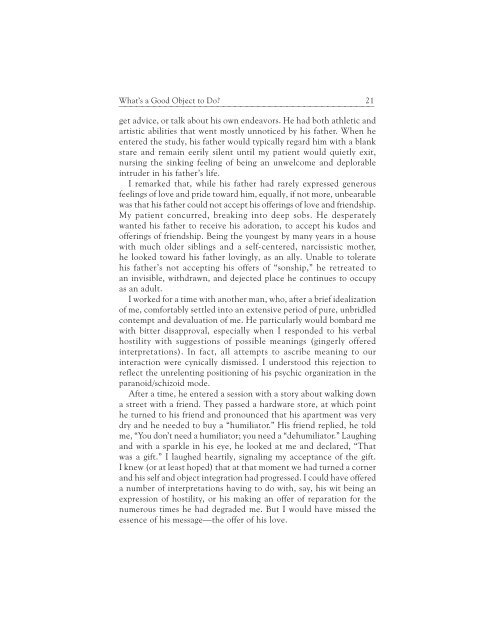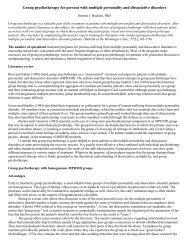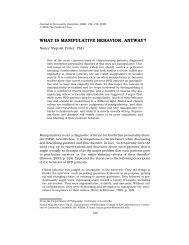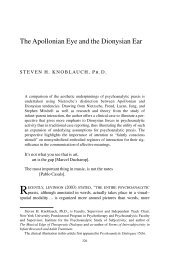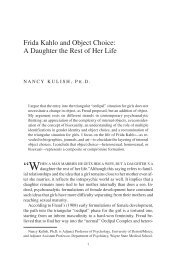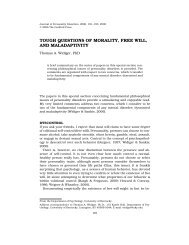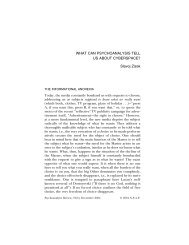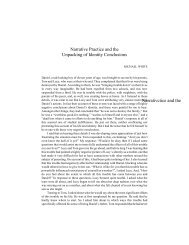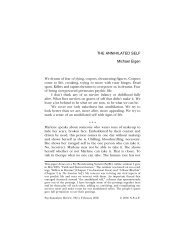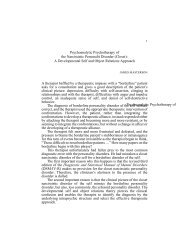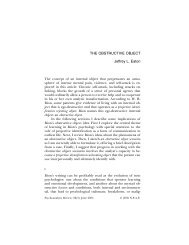What's a Good Object to Do? - PsyBC
What's a Good Object to Do? - PsyBC
What's a Good Object to Do? - PsyBC
Create successful ePaper yourself
Turn your PDF publications into a flip-book with our unique Google optimized e-Paper software.
What’s a <strong>Good</strong> <strong>Object</strong> <strong>to</strong> <strong>Do</strong> 21<br />
⎯⎯⎯⎯⎯⎯⎯⎯⎯⎯⎯⎯⎯⎯⎯⎯⎯⎯⎯⎯⎯⎯⎯⎯⎯⎯⎯⎯⎯⎯⎯⎯⎯⎯⎯⎯⎯⎯⎯⎯⎯⎯⎯⎯<br />
get advice, or talk about his own endeavors. He had both athletic and<br />
artistic abilities that went mostly unnoticed by his father. When he<br />
entered the study, his father would typically regard him with a blank<br />
stare and remain eerily silent until my patient would quietly exit,<br />
nursing the sinking feeling of being an unwelcome and deplorable<br />
intruder in his father’s life.<br />
I remarked that, while his father had rarely expressed generous<br />
feelings of love and pride <strong>to</strong>ward him, equally, if not more, unbearable<br />
was that his father could not accept his offerings of love and friendship.<br />
My patient concurred, breaking in<strong>to</strong> deep sobs. He desperately<br />
wanted his father <strong>to</strong> receive his adoration, <strong>to</strong> accept his kudos and<br />
offerings of friendship. Being the youngest by many years in a house<br />
with much older siblings and a self-centered, narcissistic mother,<br />
he looked <strong>to</strong>ward his father lovingly, as an ally. Unable <strong>to</strong> <strong>to</strong>lerate<br />
his father’s not accepting his offers of “sonship,” he retreated <strong>to</strong><br />
an invisible, withdrawn, and dejected place he continues <strong>to</strong> occupy<br />
as an adult.<br />
I worked for a time with another man, who, after a brief idealization<br />
of me, comfortably settled in<strong>to</strong> an extensive period of pure, unbridled<br />
contempt and devaluation of me. He particularly would bombard me<br />
with bitter disapproval, especially when I responded <strong>to</strong> his verbal<br />
hostility with suggestions of possible meanings (gingerly offered<br />
interpretations). In fact, all attempts <strong>to</strong> ascribe meaning <strong>to</strong> our<br />
interaction were cynically dismissed. I unders<strong>to</strong>od this rejection <strong>to</strong><br />
reflect the unrelenting positioning of his psychic organization in the<br />
paranoid/schizoid mode.<br />
After a time, he entered a session with a s<strong>to</strong>ry about walking down<br />
a street with a friend. They passed a hardware s<strong>to</strong>re, at which point<br />
he turned <strong>to</strong> his friend and pronounced that his apartment was very<br />
dry and he needed <strong>to</strong> buy a “humilia<strong>to</strong>r.” His friend replied, he <strong>to</strong>ld<br />
me, “You don’t need a humilia<strong>to</strong>r; you need a “dehumilia<strong>to</strong>r.” Laughing<br />
and with a sparkle in his eye, he looked at me and declared, “That<br />
was a gift.” I laughed heartily, signaling my acceptance of the gift.<br />
I knew (or at least hoped) that at that moment we had turned a corner<br />
and his self and object integration had progressed. I could have offered<br />
a number of interpretations having <strong>to</strong> do with, say, his wit being an<br />
expression of hostility, or his making an offer of reparation for the<br />
numerous times he had degraded me. But I would have missed the<br />
essence of his message—the offer of his love.


